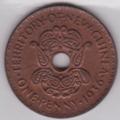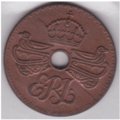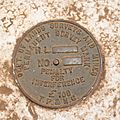New Guinean pound facts for kids
Quick facts for kids New Guinean pound |
|
|---|---|
| User(s) | Territory of New Guinea |
| Pegged with | Australian pound at par |
| Subunit | |
| 1⁄20 | shilling |
| 1⁄240 | penny |
| Symbol | £ |
| shilling | s or /– |
| penny | d |
| Plural | |
| penny | pence |
| Coins | 1⁄2d, 1d, 3d, 6d, 1/– |
The pound was the money used in the Territory of New Guinea. This area is now part of Papua New Guinea. People used the pound there from 1915 to 1966.
The pound took over from the New Guinean mark. This happened after Australia took control of the area. Australia took over from Germany at the end of World War I.
One New Guinean pound was worth the same as one Australian pound. A pound was split into 20 shillings. Each shilling was then split into 12 pence.
No paper money (banknotes) was ever made for the New Guinean pound. Any money worth more than one shilling was Australian currency.
Australian pound coins were used alongside special New Guinean coins. These New Guinean coins were made between 1929 and 1945. After 1945, no more New Guinean coins were produced.
Between 1942 and 1945, the Japanese took control of the area. They introduced their own money, called the Oceanian pound. After the war, Australian coins and banknotes were used again.
The Australian dollar replaced the Australian pound in 1966. Then, in 1975, Papua New Guinea got its own money, the Papua New Guinean kina. The kina replaced the Australian dollar. The Australian dollar was no longer official money in Papua New Guinea after January 1, 1976.
Coins of New Guinea
First Coins in 1929
In 1929, the first special coins for New Guinea came out. These were halfpennies and pennies. They were made of nickel or cupro-nickel.
A special feature of these coins was a hole in the middle. All later New Guinean coins also had this hole.
The coins had words on both sides. On one side, it said Georgius V. D G Rex et Ind. Imp.. This Latin phrase means "George the Fifth, by the Grace of God King and Emperor of India". On the other side, it said Territory of New Guinea.
These first coins are very hard to find today. They were taken out of use soon after they were made.
More Coins and New Kings
In 1935, more coins were made. These included threepences, sixpences, and shillings.
The next year, pennies were made showing King Edward VIII. This was quite rare. Edward VIII was king for less than a year before he gave up his throne. Because of this, most countries that showed the British king on their money did not have time to make new coins with his image.
Coins with George VI on them started being made in 1938. Production of New Guinean coins stopped in 1945.
New Guinean coins were not made again until 1975. That's when Papua New Guinea started using its own money, the Papua New Guinean kina.
Images for kids
 | Precious Adams |
 | Lauren Anderson |
 | Janet Collins |





